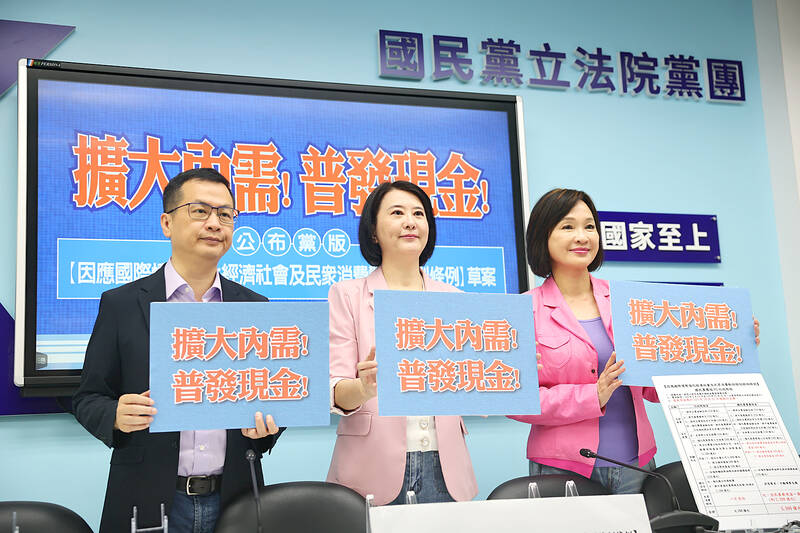A bill proposed by the Chinese Nationalist Party (KMT) caucus yesterday to cushion the impact of US tariffs on Taiwan’s economy includes giving cash handouts to people.
At a news conference in Taipei, the KMT caucus unveiled the bill that would allow the central government to allocate up to NT$390 billion (US$12.94 billion) for various measures aimed at countering the impact of US tariffs on Taiwan’s industrial and agricultural sectors, as well as on the broader economy.
A key provision of the bill mandates that the government issue a cash handout of NT$10,000 to each Taiwanese national, with the total cost estimated to be NT$230 billion, before the end of October. It was unclear whether the bill also intended to give the handout to non-citizen permanent or other residents in Taiwan.

Photo: CNA
KMT Legislator Wang Hung-wei (王鴻薇) said that distributing cash handouts could help Taiwanese people cope with economic turbulence brought about by US President Donald Trump’s pledge to impose heavy levies on Taiwanese goods. It could also boost the local economy by stimulating consumption, Wang said.
Trump announced a 32 percent "reciprocal tariff" on most Taiwanese products in early April, but the sweeping tariff was later put on pause for 90 days and replaced with a reduced import tax of 10 percent that applied to most countries.
Unlike the Cabinet’s version introduced on April 24, the KMT’s bill does not include NT$100 billion in funding for Taiwan Power Co (Taipower) to cover its financial losses.
KMT Legislator Ko Chih-en (柯志恩), instead, called on the government to revise its current energy policy, given that Taipower had failed to resolve its financial problems even though it had received government aid for several consecutive years.
Taipower had accumulated deficits as much as NT$420 billion by the end of 2024 despite the Democratic Progressive Party (DPP) government’s repeated injection of funds into the state-run company from its annual budgets.
The Cabinet has said the latest attempt to fund Taipower was part of government efforts to respond to the US tariff shocks, arguing that it would help stabilize consumer prices and ease the burden on Taiwanese industries.
The Cabinet’s NT$410 billion authorization bill also includes NT$150 billion in funding for measures to strengthen Taiwan’s security, in addition to a NT$93 billion support package that was first proposed after the Trump administration announced the tariffs.
On Monday, the caucus of the smaller Taiwan People’s Party (TPP) also proposed its version of the bill, which includes NT$6,000 cash handouts for Taiwanese citizens and leaves out aid for Taipower.
In response to media queries for comment on the opposition parties’ calls to offer cash handouts to people, Premier Cho Jung-tai (卓榮泰) yesterday said that it was "not the most effective or the best" approach the country needed currently, but he didn’t elaborate.

CARGO LOSS: About 50 containers at the stern of the ‘Ever Lunar’ cargo ship went overboard, prompting the temporary closure of the port and disrupting operations Evergreen Marine Corp, Taiwan’s largest container shipper, yesterday said that all crew members aboard the Ever Lunar (長月) were safe after dozens of containers fell overboard off the coast of Peru the previous day. The incident occurred at 9:40am on Friday as the Ever Lunar was anchored and waiting to enter the Port of Callao when it suddenly experienced severe rolling, Evergreen said in a statement. The rolling, which caused the containers to fall, might have been caused by factors including a tsunami triggered by an earthquake in Russia, poor winter sea conditions in South America or a sudden influx of waves,

The Ministry of Culture yesterday officially launched the “We TAIWAN” cultural program on Osaka’s Nakanoshima sandbank, with the program’s mascot receiving overwhelming popularity. The cultural program, which runs from Aug. 2 to 20, was designed to partner with and capitalize on the 2025 World Expo that is being held in Osaka, Japan, from April 13 to Oct. 13, the ministry said. On the first day of the cultural program, its mascot, a green creature named “a-We,” proved to be extremely popular, as its merch was immediately in high demand. Long lines formed yesterday for the opening

The Taipei Summer Festival is to begin tomorrow at Dadaocheng Wharf (大稻埕), featuring four themed firework shows and five live music performances throughout the month, the Taipei Department of Information and Tourism said today. The festival in the city’s Datong District (大同) is to run until Aug. 30, holding firework displays on Wednesdays and the final Saturday of the event. The first show is scheduled for tomorrow, followed by Aug. 13, 20 and 30. To celebrate the 30th anniversary of Disney Pixar's movie Toy Story, the festival has partnered with Walt Disney Co (Taiwan) to host a special themed area on

BE CAREFUL: The virus rarely causes severe illness or death, but newborns, older people and those with medical conditions are at risk of more severe illness As more than 7,000 cases of chikungunya fever have been reported in China’s Guangdong Province this year, including 2,892 new cases last week, the Centers for Disease Control (CDC) yesterday said it is monitoring the situation and considering raising the travel notice level, which might be announced today. The CDC issued a level 1 travel notice, or “watch,” for Guangdong Province on July 22, citing an outbreak in Foshan, a manufacturing hub in the south of the province, that was reported early last month. Between July 27 and Saturday, the province reported 2,892 new cases of chikungunya, reaching a total of 7,716